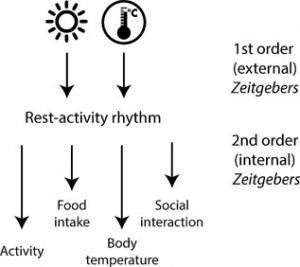-
The Dark Period
- The Body Clock
- The Dark Period
- Scheduling the Dark Period on Polyphasic Schedules
- Quiz 1
- ULTIMATE Light Filtering Calculator
- Products
- Software
- Issues with the Dark Period & How to Overcome Them
- Using Three Noons to Determine the Timing of Your Circadian Rhythm
- The Nervous System: An In-depth Explanation Why Certain Activities Should be Avoided
The Body Clock
Circadian Rhythm
The Circadian Rhythm (body clock) is a 24-hour rhythm that aligns with the local sunrise and sunset times. The primary decider is light exposure.
However, other Zeitgebers such as breakfast and other factors also influence it.


Hormonal regulation
The circadian rhythm consists of hormonal balances that fluctuate through the day to optimize bodily processes.
- These include the regulation of melatonin, which is important for SWS. Additionally, it also affects the timing of the most effective REM sleep.
- Other regulated hormones include testosterone, human growth hormone, prolactin, cortisol, insulin and a ton more!
Nevertheless, we will focus on melatonin. This is largely because it is the main hormone that polyphasic sleepers pay most attention to.
- Melatonin levels rise at dusk, signaling that sleep should begin.
- Because of the high melatonin levels, first two sleep cycles will contain most of the night’s SWS & less REM than later sleep cycles.
- The percentage of REM in sleep is highest generally from 06:00-09:00 according to the solar rhythm. Solar rhythm is an important topic that we will touch on later in the course.
External cues
- External cues, like light frequencies from blue and green light (400nm-530nm), are from the sun or artificial light sources.
- Food, temperature and exercise can influence your circadian rhythm as well.
Nowadays, most people shift their circadian rhythm forward by evening screen time and artificial light exposure. This makes it difficult for the proper amount of melatonin to build and can lead to sleep issues. However, some ways to negate these issues include:
- Filtering the light, or
- Restricting the use of electronics within two hours before bed.
How the circadian rhythm works is comparable with dogs’ daily life.
- Dogs are very adaptive to a routine. If you feed them at a certain time and take them out for a walk, they will learn to associate the feeding as a sort of preparation for the walk.
- If you feed them earlier some day, they will be somewhat confused. However, they would also want to go out for a walk earlier than usual.
This scenario is similar to the circadian rhythm that I want you to visualize. If you give it the same inputs, it will not be confused. Everything will be fine; nonetheless, if you change them up, the rhythm itself will not know what is going on. Regardless, it will still remain intact & only shift accordingly.
Therefore, the circadian rhythm is like a very complex clock. It is alterable by its surroundings. However, it also relies on the surroundings to be stable.
Consequences with circadian disruption
So, what happens if you just keep disrupting your circadian rhythm?
It will start affecting your body negatively. Some possible effects from having a bad circadian health include:
- Diabetes,
- Obesity
- Cardiovascular diseases.

Thus, you definitely want to avoid messing with its structure too much, especially if you’re sleeping polyphasically. This is because you have a natural option to expose yourself to artificial light around the clock.
- Research with desynchronization schedules or significantly shortened sleep-wake cycles also assert that the circadian rhythm does not really change its length when you sleep-wake rhythm changes.
- If you keep introducing light at late hours, waking up early and immediately exposing yourself to more light, you are vulnerable to some nasty diseases.
One thought on “The Body Clock”
Leave a Reply
You must be logged in to post a comment.

Great stuff!